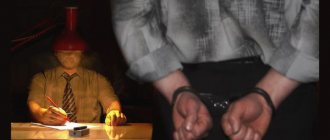“Mental disorder matters to a judge not as an illness, but as a phenomenon that excludes responsibility. It is not because a person becomes insane because he is sick, but because illness deprives him of freedom of judgment and the freedom to choose one or another course of action.”
V.P. Serbian
In many high-profile cases of brutal murders, at one time or another, the question of the insanity of the accused (suspect) is raised - it is difficult for a normal person to understand how one can take a life in cold blood, dismember it and move on with life. This time in the article we discuss the fate of persons declared insane by the court, the process of establishing insanity and how this affects the final court decision regarding the defendants, as well as possible measures to protect society from new dangerous acts of such persons.
The reason for the discussion was quite logical questions: how accurately the results of a forensic psychiatric examination can give an answer about sanity when committing a crime, whether the prescribed compulsory medical measures are sufficient to protect society from the subsequent actions of an insane person, and what are the guarantees that the insane person will not soon be released to freedom, and the number of his victims will not be replenished with new names?
The topic proposed for discussion is extremely complex and very important. It is located at the intersection of several branches of knowledge and types of social activities - psychiatry, judicial and law enforcement activities, guardianship, trusteeship and others. The situation in this area is aggravated by a set of problems traditional for modern Russia. This, in our opinion, is the complexity of the logical construction of Art. 21 and 22 of the Criminal Code of the Russian Federation, the lack of definition of all terms used in these articles within the Criminal Code of the Russian Federation, the ambiguity of the procedures for conducting forensic psychiatric examinations and the variability of actions of the prosecutor’s office based on the results of such examinations, judicial practice of the very rare application of Art. 22 of the Criminal Code of the Russian Federation.
To further complicate the situation, the interests of members of organized criminal groups and communities often flow there. On the one hand, the mentally ill and mentally ill (and simply lonely, elderly citizens who are unreasonably labeled as mentally ill, incompetent, and in need of compulsory treatment) who have housing and other valuable property become victims of professional criminals. On the other hand, falsified medical histories, results of examinations, examinations, as well as a combination of bribery and intimidation of officials sometimes make it possible to divert dangerous criminals from criminal liability, in order to then quickly ensure their release as “recovered”.
The court's decision to declare the defendant (let's say he committed a murder) insane at first glance seems to be a relief for the killer himself. After all, if he is declared crazy, then there is no talk of any prison. But the conditions in the hospital are just as strict as in the colony, and they are placed there without a term. And although de jure this cannot be called a punishment, de facto the murderers have to “serve their time” in full. Or maybe even more.
Legal approaches to determining insanity
The traditional interpretation of insanity is based on its definition through two criteria: medical (psychiatric) and legal (psychological). These criteria are understood, respectively, as the presence of an illness or other painful mental disorder and the resulting inability to realize the nature or meaning of one’s actions or to manage them. Both criteria of insanity are interrelated and mandatory. The absence of any of them excludes the presence of the specified state of a person’s psyche, since the insanity of a person includes a simultaneous combination of medical and legal criteria.
Insanity is a state of a person established by a court on the basis of a psychiatric examination, which excludes the application of criminal law in relation to him. The legal meaning of insanity is the release of a citizen who has committed a socially dangerous act described in criminal law from criminal and civil liability. To put it simply, an insane person can crash your car in an accident, beat you, rob your wife, rape your child, and nothing will happen to him for this, and no one will compensate you for either material or moral damage.
In modern Russian legislation, insanity is defined in Article 21 of the Criminal Code of the Russian Federation:
Article 21. Insanity
- A person who, at the time of committing a socially dangerous act, was in a state of insanity, that is, could not realize the actual nature and social danger of his actions (inaction) or control them due to a chronic mental disorder, temporary mental disorder, dementia or other painful condition, is not subject to criminal liability. psyche.
- A person who has committed a socially dangerous act provided for by criminal law in a state of insanity may be imposed by a court with compulsory medical measures provided for by this Code.
Insanity excludes the very concept of crime. The act of an insane person seems to be a case that entails only preventive measures, for example, placement in a psychiatric hospital, under the special supervision of guardians, etc.
But these measures are not a consequence of an act committed, but of the discovery of a painful condition that requires special supervision and treatment. No one is responsible for the civil consequences of a crime committed by an insane person, except in cases where a guardian has already been appointed by the court to the insane person before the commission of the crime. The guardian bears civil liability only if he could have prevented the commission of the crime and/or through obvious negligence allowed it to be committed. But in this case, liability is determined not by the fact that the crime was committed by an insane person, but by the fact that there was negligence of the persons whose duties included supervision. If it is proven that the person who committed the crime is in a state of insanity, criminal prosecution cannot be initiated, and the one initiated can be terminated.
Nevertheless, such a person does not remain free, because he is dangerous to society. Current legislation provides that “mad and insane”, if they cause death or encroach on the life of another or their own, are sent for compulsory treatment by court decision, even in the event that their parents or relatives wish to take upon themselves the obligation to watch look after them and treat them at home. The law provides for the possibility of placing persons who commit a crime in a state of insanity for treatment in closed psychiatric hospitals (there are eight such hospitals in Russia). In fact, this is the same prison, since it is almost impossible to escape from there.
Such a medical institution is an institution that has both the characteristics of a medical institution and a colony: there are bars on the windows, the doors to the rooms are locked, patients leave them only to eat, use the toilet or to breathe air in a small exercise yard. Personal space is limited, there is a lot of crowding of people. A person spends all his time in these conditions. He is isolated not only from society, but also from medical staff. The corridor where the doors open ends with bars. FSIN officers armed with service weapons are on duty in the corridor and outside the perimeter. There are fences and video cameras all around. In fact, the medical facility is equipped as a correctional facility. An insane person who ends up here must take medication, regardless of whether he wants to or not. At the same time, all unfavorable social ties are broken. After undergoing treatment under strict conditions, usually lasting several years, the patient is not immediately discharged to life. If doctors see that the condition is sufficiently compensated, the local commission sends a petition to the court to transfer the citizen to treatment with an enhanced monitoring regime. Then six months or a year passes, and if the state of mental health improves, the patient is transferred to a regular psychiatric hospital, then to compulsory outpatient treatment by a psychiatrist, of course, provided that his condition allows it.
In general, the more serious the socially dangerous act, the more stringent the requirements for the person who committed it, the more isolated he is, and he will definitely not be able to leave a psychiatric institution quickly. Some patients who show no improvement in their mental health and remain dangerous to society remain in such hospitals for years.
It is worth emphasizing that compulsory treatment cannot be considered a punishment - it is a precautionary measure to protect society from the subsequent actions of an insane person. At the same time, there is a common opinion that if a person has committed a crime, especially a resonant one, in a state of insanity, he evades responsibility, since compulsory treatment is not comparable to the committed act. However, the regime in closed medical psychiatric institutions is very strict; this is not a health-improving sanatorium with spa treatments and relaxing massages; specialized psychiatric treatment is applied to the patient.
Moreover, the perpetrator is not given a specific period of time for treatment, as is the case with prison. Here all key decisions remain with doctors. When they are sent to a hospital, a second medical commission is held either once a year or every six months, and if it recognizes that the person has recovered, which is not always the case, then he can be released.
Even after discharge, a person must be observed by a psychiatrist and registered, as happens with people released early from prison. But it may not come to this - often criminals sent for compulsory treatment can be left in hospitals for life if their illness is not treated.
Part 1 of Article 21 of the Criminal Code of the Russian Federation lists various types of mental disorders, including: chronic mental disorders, temporary mental disorders, dementia and other painful mental conditions.
Let us note that these concepts constitute the medical criterion of insanity, considered in conjunction with the legal one, which in turn contains:
- intellectual - the impossibility of realizing the actual nature and social danger of one’s actions (inactions);
- strong-willed, which means the inability to lead them;
- Also, in the science of criminal law, a temporal criterion is highlighted, which links medical and legal criteria with the time of commission of a socially dangerous act.
A chronic mental disorder is understood as “a long-term mental illness that tends to progress, that is, to a gradual increase and complication of mental disorders.” Naumov A.V. noted that chronic mental disorders “can sometimes occur in attacks (that is, with an improvement or deterioration of the mental state), but they can leave behind a persistent mental defect.”
Such disorders usually include schizophrenia, epilepsy, progressive paralysis, bipolar disorder (the one that previously bore the “politically incorrect” name of manic-depressive psychosis, etc.). However, “the mere presence of the listed diseases is not a basis for declaring him insane.” In psychiatry, for example, there are more than 100 types of schizophrenia, many of which occur latently and, therefore, cannot influence the intellectual element of the legal criterion. Moreover, psychiatry is currently developing rapidly, finding new methods of treating mental illnesses that make it possible to achieve long-term remissions, which, of course, affects the course of many chronic mental disorders.
Temporary mental disorders include those diseases that develop quickly, last a short time and end with complete recovery.
Such mental disorders arise spontaneously, and are also “characterized by a dynamic course, usually accompanied by severe disturbances of consciousness, orientation, productive psychopathological states in the form of illusions, hallucinations and delusional interpretation of the environment. Temporary mental disorders include alcoholic psychosis in the form of delirium (delirium tremens), twilight disorder of consciousness (characterized by amnesia), etc.
Dementia refers to all mental disorders accompanied by persistent impoverishment and simplification of mental activity, characterized by disruption of cognitive processes, behavior, impoverishment of emotions and individual character traits (up to their complete disappearance).
Dementia is associated with a decrease or loss of a person’s mental abilities and is congenital or acquired as a result of one or another progressive mental illness. For example, oligophrenia is classified as congenital, and encephalitis is classified as acquired. So, we note that there are three degrees of dementia: mild (debility), moderate (imbecility) and severe (idiocy).
The last, fourth sign of the medical criterion most often includes those diseases that, although not classified as a mental disorder, may, at the time of exacerbation, be accompanied by mental disorders. Such, for example, as acute hallucinatory delusional states caused by infection (with typhoid and typhus or acute chemical poisoning), severe head injuries, brain tumors, drug addiction or sleepwalking, as well as some forms of psychopathy (severe schizoid psychopathy), some forms of deaf-muteness.
However, the signs of the medical criterion that we have considered do not yet provide complete confidence in the insanity of the person who committed the crime, since the presence of one of the listed diseases may not affect the intellectual or volitional elements.
The leading criterion for determining insanity is legal, indicating the depth of mental disorder, which does not allow a person to realize the social danger and the consequences of his actions (inactions) and manage them.
It is the legal criterion that indicates the condition under which a mental disorder acquires criminal legal significance.
The legal criterion is a generalized characteristic of the same clinical data on mental disorders, but from the point of view of their influence on the attitude towards the crime being committed, and consists of two signs:
- intellectual, as a violation of the ability to understand the actual nature and social danger of one’s actions
- volitional, as a violation of the ability to direct such actions.
Mental disorders that do not exclude sanity
In addition, there are mental disorders that do not lead to insanity. An expert assessment of such accused persons is provided for in Art. 22 of the Criminal Code of the Russian Federation, which is formulated as follows:
Article 22. Criminal liability of persons with a mental disorder that does not exclude sanity
- A sane person who, at the time of committing a crime due to a mental disorder, could not fully understand the actual nature and social danger of his actions (inaction) or control them, is subject to criminal liability.
- A mental disorder that does not preclude sanity is taken into account by the court when assigning punishment and can serve as a basis for imposing compulsory medical measures.
This article of the Criminal Code of the Russian Federation introduces into practice the concept of limited or reduced sanity. With such disorders, a person “cannot fully understand the actual nature and social danger of his actions (inaction) or control them.” Essentially, we are talking about a partial violation of one of the signs of a legal criterion. That is, to establish a legal criterion of limited sanity, the presence of one of its elements – volitional or intellectual – is sufficient.
The medical criterion of insanity and limited sanity also has almost one hundred percent similarity. As noted earlier, there are more than 100 types of schizophrenia, more than half of which do not deprive a person of the opportunity to be more or less aware of the actual nature of the action (inaction) they perform.
In forensic psychiatry, diseases that do not exclude sanity are called mental abnormalities, which are a set of mental abnormalities that lead to personal changes.
Such diseases include psychopathy, character accentuations (not pronounced character deviations, which in certain stressful situations can lead to decompensation - disruption of the mental balance of the individual), mental retardation, consequences of severe traumatic brain injuries, as well as organic lesions of the central nervous system and vascular diseases brain, sometimes include mild forms of epilepsy, various types of disorders of desires and habits.
However, the listed mental anomalies only have an impact on the psyche of a person when they deprive him of the opportunity to fully understand the actual nature and social danger of his act or to fully manage it.
If the mental properties of a person are expressed in mental disorders, then they can become a medical criterion for insanity or limited sanity. It is possible to differentiate them only by legal criteria.
The concept of sanity in criminal law
Definition 1
Sanity is an adequate state of a healthy person, in particular the state of his psyche, which is expressed in the ability to realize the real nature and social potential danger of his actions and manage them.
According to criminal law, the concept of “sanity” is contrasted with the concept of “insanity”.
Definition 2
Insanity is a state of a person that is caused by an inadequate state of his psyche or dementia, that is, an insane subject is not able to be aware of his own behavior and control his actions at the time of committing a crime. Insanity is established by a forensic psychiatric examination.
Are you an expert in this subject area? We invite you to become the author of the Directory Working Conditions
The subject of an offense of any gravity can be a sane individual who has reached the age of 14. Any person involved in the case whose state of insanity is confirmed by a medical examination is not subject to criminal liability and is not the subject of a crime (Article 21 of the Criminal Code of the Russian Federation).
Criteria characterizing the state of insanity:
- medical (physical);
- legal (psychological).
Age-related insanity
Another mental state of a person that has criminal legal significance is the so-called “age-related insanity”, which is not subject to criminal liability. As a general rule, a person over 16 years of age can bear criminal liability. However, from the age of 14, one can be held criminally liable for committing crimes that are listed in Part 2 of Art. 20 of the Criminal Code of the Russian Federation.
It should be noted here that not all persons who have reached the age specified by law, due to the lack of the necessary psychophysical properties, can correctly assess their behavior. In such cases, the rule formulated by the legislator in Part 3 of Article 20 of the Criminal Code of the Russian Federation is applied. This concept excludes the medical criterion of insanity, since this norm speaks of mental retardation (discrepancy between the intellectual development of a person and the age reached by the person), and not of a mental disorder. The reasons for such a delay in development may be social infantilism, sensory deprivation, somatic diseases suffered in early childhood, namely, before the age of 2 years in severe form.
Thus, “age-related insanity”, like insanity, excludes criminal liability.
Special crime subject
A special subject of a crime in Russian criminal law is a person characterized, in addition to the general ones, by additional characteristics necessary to form a crime of a certain type.
These signs can be classified as follows:
1. Civil legal status of a person (citizen of the Russian Federation - Article 275 of the Criminal Code of the Russian Federation, foreign citizen or stateless person - Article 276 of the Criminal Code of the Russian Federation).
2. To the profession or type of activity of the subject (doctor - Article 124 of the Criminal Code of the Russian Federation, official - Article 285-290 of the Criminal Code of the Russian Federation, judge - Article 305 of the Criminal Code of the Russian Federation, military personnel - Chapter 33 of the Criminal Code of the Russian Federation).
3. To the demographic properties of the subject (man - Article 131 of the Criminal Code of the Russian Federation, parents - Article 157 Part 1 of the Criminal Code of the Russian Federation, children - Article 157 Part 2 of the Criminal Code of the Russian Federation).
4. To the criminal past of the person (a person who has repeatedly committed murder - Article 105, part 2 p.n.) of the Criminal Code of the Russian Federation).
Signs of a special subject are additional, optional features. Like all optional features, they can be: a qualifying feature that forms the corpus delicti of a crime under aggravating circumstances (the appropriation of someone else's property entrusted to the perpetrator is committed using his official position - Article 160, Part II, Clause “c” of the Criminal Code of the Russian Federation). As circumstances mitigating or aggravating punishment (Article 63, Part 1, Clause “m” of the Criminal Code of the Russian Federation provides as an aggravating circumstance for committing a crime using the trust placed in the perpetrator by virtue of his official position or contract).







